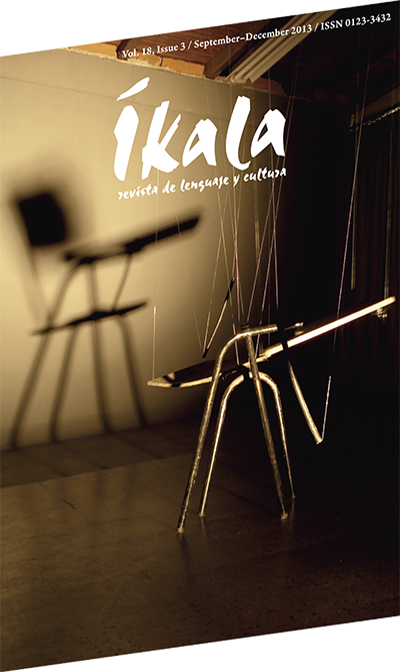Les Exigences Cognitives et l'Auteur en Anglais Langue Étrangère (ALE) : Observations sur le Type, le Niveau et l'Autonomie
DOI :
https://doi.org/10.17533/udea.ikala.16040Mots-clés :
théorie du double processus, processus d'écriture, écriture en anglais langue étrangèreRésumé
Travaux de recherche qui visent à comprendre le processus par lequel les rédacteurs d’ALE concentrent la révision de leurs textes sur des questions de grade : capacité cognitive et complexité ou volume des devoirs. Cet essai explore certains des liens entre dual process theories et composition en ALE afin d'argumenter sur les types de sujets qui pourraient être tout aussi pertinents. Son objectif est de démontrer que le type de processus cognitifs liés à l'étape de la révision définit souvent quel type d'information est traitée, comment elle est traitée et, par la suite, comment l'auteur se sent face à ses décisions.
Téléchargements
Références
Bloodgood, J. (2002). Quintilian: A classical educator speaks to the writing process. Reading Research and Instruction, 42(1), 30–43.
Chapman, L. J., & Chapman, J. P. (1982). Tests results are what you think they are. In D. Kahneman, P. Slovic, & A. Tversky, (Eds.), Judgment under uncertainty: Heuristics and biases (pp. 239–248) New York, NY: Cambridge University Press.
Connor, U., & Farmer, M. (1990). The teaching of topical structure analysis as a revision strategy for ESL writers. In B. Kroll (Ed.), Second language writing: Research insights for the classroom (pp. 126–139). New York, NY: Addison-Wesley.
Erickson, T., & Mattson, M. (1981). From words to meaning: A semantic illusion. Journal of Verbal Learning and Verbal Behavior, 20, 540–551.
Flower, L., & Hayes, R. (1981). A cognitive process theory of writing. College Composition and Communication, 32, 365–387.
Gilbert, D. (1991). How mental systems believe. American Psychologist, 46(2), 107–119.
Gómez, R., Parker, R., Lara-Alecio, R., & Gómez, L. (1996). Process versus product writing with limited English proficient students. The Bilingual Research Journal, 20, 209–233.
Graham, S. (2008). Strategy instruction and the teaching of writing: A meta-analysis. In C. MacArthur, S. Graham, & J. Fitzgerald, (Eds.), Handbook of writing research (pp.187–207). New York, NY: The Guilford Press.
Hayes, J. (2004). What Triggers Revision? In L. Allal, L. Chanquoy, & P. Largy (Eds.), Revision: cognitive and instructional processes (pp. 9–20). Norwell, MA: Kluwer.
Hillocks, G. (1986). Research on written composition. Illinois, IL: ERIC Clearinghouse on Reading and Communication Skills.
Hume, D. (2007). An enquiry concerning human understanding and other writings. London, United Kingdom: Cambridge University Press.
Kahneman, D. (2011). Thinking, fast and slow. New York, NY: Ferrar, Straus, and Giroux.
Kellogg, R. (1988). Attentional overload and writing performance: Effects of rough draft and outline strategies. Journal of Experimental Psychology: Learning, Memory, and Cognition, 14, 355–365.
Kellogg, R. (1996). A model of working memory in writing. In C. M. Levy & S. Ransdell (Eds.), The science of writing, theories, methods, individual differences, and applications (pp. 57–71) Mahwah, NJ: Erlbaum.
Kellogg, R. (2001). Long term-working memory in text production. Memory and Cognition, 29(1), 43–52.
Kroll, B. (Ed.). (1990). Second language writing: Research insights for the classroom. New York, NY: Cambridge University Press.
Johns, A. (1986). Coherence and academic writing: some definitions and suggestions for teaching. TESOL Quarterly, 20, 247–266.
Jones, C. S., & Tetroe, J. (1987). Composing in second language. In A. Matsuhashi (Ed.), Writing in real time (pp. 34–57). New York, NY: Addison-Wesley.
Liebman-Kleine, J. (1986). In defense of teaching process in ESL composition. TESOL Quarterly, 20, 783–788.
Mendonca, C., & Johnson, K. (1994). Peer review negotiations: Revision activities in ESL writing instruction, TESOL Quarterly, 28, 745–769.
National Writing Project. (2012). History of NWP. National Writing Project. Retrieved from http://www.nwp.org/cs/public/print/doc/about/history.csp
Olive, T., & Piolat, A. (2002). Suppressing visual feedback in written composition: Effects on processing demands and coordination of the writing process. International Journal of Psychology, 37(4), 209–218.
Polya, G. (1957). How to solve it. Princeton, NJ: Princeton University Press.
Reid, J. (1989). English as a second language composition in higher education: The expectations of the academic audience. In D. Johnson and D. Roen (Eds.), Richness in writing: Empowering ESL students (pp. 220–234). New York, NY: Longman.
Rijlaarsdam, G., & Van den Bergh, H. (2008). Writing process theory: A functional dynamic approach. In C. MacArthur, S. Graham, & J. Fitzgerald, (Eds.), Handbook of writing research (pp. 41– 53). New York, NY: The Guilford Press.
Silva, T. (1990). Second language composition instruction: Developments, issues, and directions in ESL. In B. Kroll (Ed.), Second language writing: Research insights for the classroom (pp. 11–23). New York, NY: Addison-Wesley.
Slovic, P., Finucane, M., Peters, E., & Mac Gregor, D. (2002). The affect heuristic. In T. Gilovich, D. Griffin, & D. Kahneman, (Eds.), Heuristics and biases: The psychology of intuitive judgment (pp. 397–420). New York, NY: Cambridge University Press.
Spack, R. (1984). Invention strategies and the ESL college composition student. TESOL Quarterly, 18, 649–670.
Surowiecki, J. (2004). The wisdom of crowds. New York, NY: Random House.
Torrence, M., & Galbraith, D. (2008). The processing demands of writing. In C. MacArthur, S. Graham, & J. Fitzgerald, (Eds.), Handbook of writing research (pp. 67–80). New York, NY: The Guilford Press.
Zamel, V. (1976). Teaching composition in the ESL classroom: What we can learn from research in the teaching of English. TESOL Quarterly, 10, 67–76.
Téléchargements
Publié-e
Comment citer
Numéro
Rubrique
Licence
(c) Tous droits réservés Íkala, Revista de Lenguaje Y Cultura 2013

Cette œuvre est sous licence Creative Commons Attribution - Pas d'Utilisation Commerciale - Partage dans les Mêmes Conditions 4.0 International.












